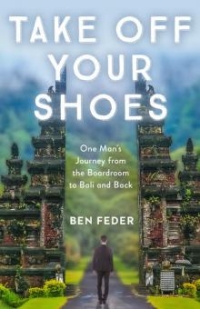An excerpt from Take Off Your Shoes
Victoria was losing patience. “I never signed up for this!” she cried in one of our increasingly heated behind-the-bedroom-door discussions. My tenure at Take Two had gone from being short-term to permanent. My schedule had filled with dinners, breakfasts, and travel, and the rising tension between us was aggravated by Victoria’s own growing commitments. She managed not only our four children’s over-scheduled lives but also a thriving community center and preschool that she had founded and in which she had been deeply engaged for seven years. Our conversations were becoming increasingly transactional, dealing with the logistics of our lives but sharing little of each other’s inner lives. I simply was not engaged in our family. Even when I was physically present, I was distracted. A constant flow of emails from multiple time zones competed intensely for my attention. She felt abandoned, we were growing apart, and I felt helpless to stop it or reverse the trend.
“I can’t control my schedule,” I said to her. “I did actually sign up for this, and I want to see it through. I want to succeed.”
“When was the last time you were home for dinner? Do you think our kids don’t notice you’re never around? Do you think they don’t notice you on a conference call when you’re supposedly watching their ballgame?” Of course she was right. I committed to being home for dinner more, even though I suspected it was only a stopgap.
I returned home from work one evening to find my oldest son, Sam, sequestered as usual in his room doing homework. I cracked open his bedroom door and poked my head in. “Hey, Sam.” He barely looked up from his math problem sets and returned a teenage grunt.
Victoria called the kids to dinner. Nobody came. It took a few more calls for the other three kids to finally arrive: first Oliver, then Rita and Nava. And only a final, angry summons convinced Sam to shuffle out from the barricade of his bedroom.
Victoria was in the kitchen spooning rice from the cooker onto a serving platter. I asked my kids, “Did anything strange or wonderful happen today?” Nava, in kindergarten, came up with a story but Sam was lost in his thoughts.
When Victoria joined us, Sam grunted, “Chicken.” I assumed he wanted someone to pass him the chicken.
“A verb, Sam,” Victoria said. “We need a verb.”
I knew Sam was going through a normal teenage phase, but still I felt my frustration rise. I lectured him to take responsibility for his family relationships but was saddened by my perceived loss of our father-son connection. When dinner ended and Victoria and I were washing up, I turned to her and said, “Four more years of this and he’s out of the house and off to college. It’s nonstop work in his high school and it’s nonstop work for me. By the time he’s gone, instead of building a relationship with him, I’ll have spent years building a company for some promise of a reward that seems always to be receding into the future.”
Victoria saw the situation similarly. “Your relationship with your kids is suffering. Not only Sam. Nava too.”
Nava was an avid reader even at a young age. On weekends, she had no time for or interest in me. When I wanted to play with her, she glared at me then stuck her nose in her book. Between her being lost in her own thoughts and my responding to the demands on my job, I was missing her childhood.
Rita, aged nine, was in a tough, catty, preteen social environment that deeply pained her. Nothing extreme ever happened; it could have been as subtle as an eye-roll or as blatant as a rejection at the lunch table. But Rita tended to process feelings on a deeper level than most. She often returned from school either tearful or belligerent before she revealed what had happened that day. She was being emotionally bullied and needed my help.
I was less concerned about my relationship with Oliver. He had a tight group of friends, twelve-year-old boys who had been together since kindergarten. He was past his formative years by the time I started at Take Two but not so old that I feared that, like Sam, his departure from home was imminent.
Still, my day-to-day experiences had gradually diverged from those of my four children and wife. We were no longer leading the same lives. When I came home with stories of travel, new cultures, or discussions with men and women who were highly effective in the world, my family was increasingly uninterested. And I sensed it acutely.
One evening, I returned home late. Exhausted from the day, I sank down into our red sofa and rested my feet on the coffee table. The younger kids were already asleep. Victoria came into the room and closed the door. She had just returned from a weekend retreat with women working in business and philanthropy. One of them had recently spent a year in Barcelona. Victoria had been gripped by the thought of it and spent the entire weekend peppering her friend with questions and squeezing out of her every bit of advice and information that she could. I listened to Victoria talk about her friend traveling abroad with her family. It was something Victoria and I had fantasized about on and off throughout our marriage. Victoria said, “Let’s go.” She used a word I had thought was reserved for academics and librarians: Sabbatical.
I was tired that day and immediately focused on the possible negative impact that a sabbatical could have on the career I’d worked so hard to develop. But I took a beat and considered the possibility. We talked more about how we could make the money work and deal with the kids’ schooling.
I reflected on my time at Take Two. We had achieved great initial success. We had taken the company from death’s door to one of the best positioned in the industry. None of it was easy. No organization hums along perfectly, firing on all cylinders all the time. Each is challenged in its own way and working through those organizational challenges was part of the fun of leadership. But it was intense work for a long time and it took its toll. Now, as Victoria knew, battle fatigue was setting in, and somehow I couldn’t shake it. In the past, my cure for exhaustion had never been rest, but rededication. I would recommit to the cause and lean into the machine. Lately, though, when I dug deep for that commitment, I was coming up empty.
The caffeine that used to fuel my days and the wine that buoyed my evenings also interrupted my sleep and insomnia was becoming chronic. I could not help feeling the emotional and physical costs of personal sacrifices made for the greater good, for the mission on which I was so focused and in which I so believed. I was getting tired of the endless striving, the ambition, and the desire for more. More wanting seemed to lead only to more wanting. I wondered if I could simply declare victory and move on.
“I need some time,” I said to Victoria.
Over the years, I learned that complex decisions, which required me to simultaneously consider many variables, were better made after they marinated in the back of my mind rather than being dealt with directly, rationally, and immediately. I was not alone. In one experiment I knew of, researchers provided participant groups complex and detailed information about four different apartments and asked them to choose the best one. The groups were allowed to devote varying amounts of time and attention to the problem. One group in particular had their conscious thought deliberately diverted by engaging in a task, like playing anagrams, designed for that purpose. That group performed better than undistracted groups, regardless of the amount of time the other groups had to consider the problem. In other words, often the best way to resolve complex situations is to find a distraction, something else to focus on. While it may not feel like it, the gears of the problem-solving mind crank away in the background even while the conscious mind is focused elsewhere. There was even evidence suggesting that attempts to verbalize or otherwise articulate the reasons we make decisions can lead to biases and poor decision-making.


